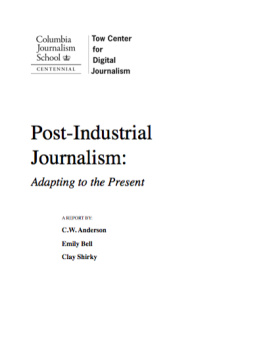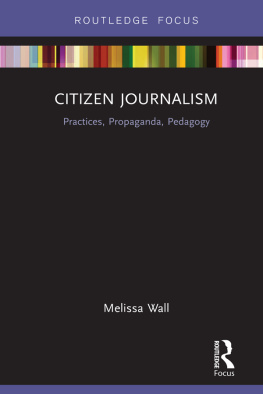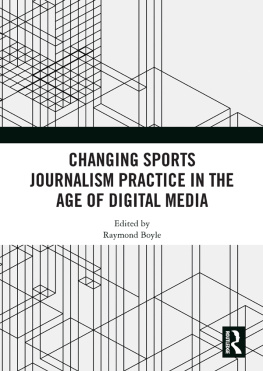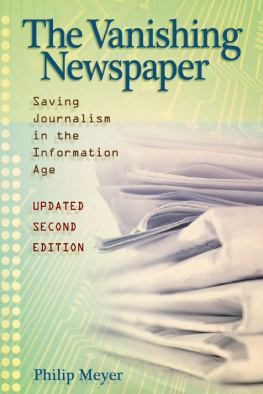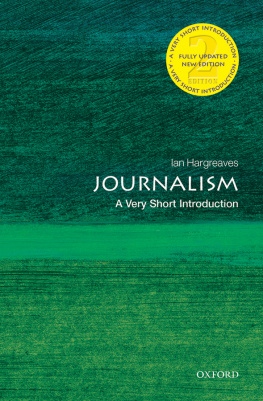Introduction
The Transformation of American Journalism Is Unavoidable
This essay is part survey and part manifesto, one that concerns itself with the practice of journalism and the practices of journalists in the United States. It is not, however, about the future of the news industry, both because much of that future is already here and because there is no such thing as the news industry anymore.
There used to be one, held together by the usual things that hold an industry together: similarity of methods among a relatively small and coherent group of businesses, and an inability for anyone outside that group to produce a competitive product. Those conditions no longer hold true.
If you wanted to sum up the past decade of the news ecosystem in a single phrase, it might be this: Everybody suddenly got a lot more freedom. The newsmakers, the advertisers, the startups, and, especially, the people formerly known as the audience have all been given new freedom to communicate, narrowly and broadly, outside the old strictures of the broadcast and publishing models. The past 15 years have seen an explosion of new tools and techniques, and, more importantly, new assumptions and expectations, and these changes have wrecked the old clarity.
Theres no way to look at organizations as various as the Texas Tribune, SCOTUSblog and Front Porch Forum or such platforms as Facebook, YouTube and Storify and see anything like coherence. Theres no way to look at new experiments in nonprofit journalism like Andy Carvins work at NPR during the Arab Spring and convince yourself that journalism is securely in the hands of for-profit businesses. And theres no way to look at experiments in funding journalism via Kickstarter, or the coverage of protest movements via mobile phone, and convince yourself that making information public can be done only by professionals and institutions.
Many of the changes talked about in the last decade as part of the future landscape of journalism have already taken place; much of journalisms imagined future is now its lived-in present. (As William Gibson noted long ago, The future is already here. Its just unevenly distributed.) Our goal is to write about what has already happened and what is happening today, and what we can learn from it, rather than engaging in much speculation.
The effect of the current changes in the news ecosystem has already been a reduction in the quality of news in the United States. On present evidence, we are convinced that journalism in this country will get worse before it gets better, and, in some places (principally midsize and small cities with no daily paper) it will get markedly worse. Our hope is to limit the scope, depth and duration of that decay by pointing to ways to create useful journalism using tools, techniques and assumptions that werent even possible 10 years ago.
We also highlight the ways new possibilities for journalism require new forms of organization. Traditional news organizations have tended to conserve both working methods and hierarchy, even as the old business models are collapsing, and even when new opportunities do not fit in those old patterns. In interview after interview with digitally focused members of the traditional press, the theme of being thwarted by process came up. Adapting to a world where the people formerly known as the audience are not readers and viewers but users and publishers will mean changing not just tactics but also self-conception. Merely bolting on a few new techniques will not be enough to adapt to the changing ecosystem; taking advantage of access to individuals, crowds and machines will mean changing organizational structure as well. (We recognize that many existing organizations will regard these recommendations as anathema.)
This essay is written for multiple audiencestraditional news organizations interested in adapting as well as new entrants (whether individual journalists, news startups or organizations not previously part of the journalistic ecosystem)and those organizations and entities that affect the news ecosystem, particularly governments and journalism schools, but also businesses and nonprofits.
We start with five core beliefs:
Journalism matters.
Good journalism has always been subsidized.
The internet wrecks advertising subsidy.
Restructuring is, therefore, a forced move.
There are many opportunities for doing good work in new ways.
Journalism Matters
Journalism exposes corruption, draws attention to injustice, holds politicians and businesses accountable for their promises and duties. It informs citizens and consumers, helps organize public opinion, explains complex issues and clarifies essential disagreements. Journalism plays an irreplaceable role in both democratic politics and market economies.
The current crisis for the institutions of American journalism convinces us of two things. First, there is no way to preserve or restore the shape of journalism as it has been practiced for the past 50 years, and, second, it is imperative that we collectively find new ways to do the kind of journalism needed to keep the United States from sliding into casual self-dealing and venality.
Not all journalism matters, of course. Much of what is produced today is simply entertainment or diversion, but here, we grapple only with what has variously been called hard news, accountability journalism or the iron core of news. Hard news is what matters in the current crisis. Rather than try to list or define the elements that separate hard news from the fluff, we have simply adopted Lord Northcliffes famous litmus test: News is something someone somewhere doesnt want printed. Everything else is advertising.
This does not mean that the output of news organizations can be cleanly divided into two categories, hard news and fluff. Sometimes a business section will run stories on tie colors; sometimes the lifestyle section will break business news in the fashion world. As we write this, the New York Daily News home page features one story on Miley Cyrus new haircut and another on the citys stubbornly high unemployment rate.
Even with that spectrum recognized, however, hard news is what distinguishes journalism from just another commercial activity. There will always be a public appetite for reporting on baseball, movie stars, gardening and cooking, but its of no great moment for the country if all of that work were taken over by amateurs or done by machine. What is of great moment is reporting on important and true stories that can change society. The reporting on the Catholic Churchs persistent harboring of child rapists, Enrons fraudulent accounting and the scandal over the Justice Departments Operation Fast and Furious are all such stories.
Because telling true stories is vital, the value of journalism cant be reduced to other, ancillary needs. Journalism performs multiple overlapping functions, and there never used to be much urgency in defining those functions. In the period in which public speech was scarce (which is to say, all of history until now), journalism was simply what journalists did, journalists were just people hired by publishers, and publishers were the relative handful of people who had access to the means of making speech public.
We believe that the role of the journalistas truth-teller, sense-maker, explainercannot be reduced to a replaceable input for other social systems; journalists are not merely purveyors of facts. Now and for the foreseeable future, we need a cadre of full-time workers who report the things someone somewhere doesnt want reported, and who do it in a way that doesnt just make information available (a commodity we are currently awash in), but frames that information so that it reaches and affects the public.
An increasing amount of firsthand reporting is done by citizensmuch of our sense of the Fukushima Daiichi nuclear disaster in Japan and the Pearl Roundabout massacre in Bahrain came from individuals on the groundbut this does not mean that all professional journalists will, can or should be replaced. Instead it means that their roles will change, overlapping with the individuals (and crowds and machines) whose presence characterizes the new news environment.

